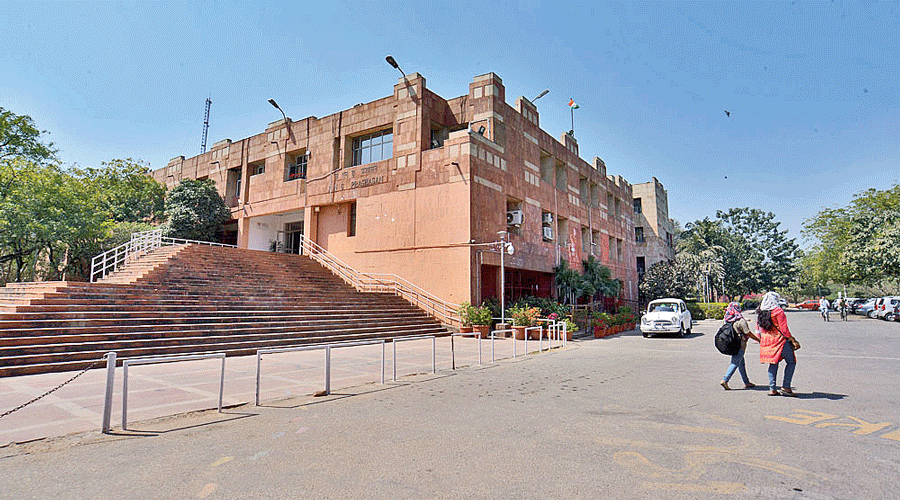A now-withdrawn JNU order that sought to penalise protests by students on the campus through fines as high as Rs 50,000, or 166 times the fees, had allegedly been introduced by keeping students and teachers in the dark.
The three teachers’ representatives on the Executive Council gave dissenting notes at a meeting on February 3 when the varsity introduced the JNU Discipline and Conduct Rules without offering any details, one EC member and another varsity official told The Telegraph. A dissenting member said the matter should have been first taken up with the Academic Council, a broader group that includes students.
However, the rules were notified the same day. After the details came to light this week, all students’ organisations called it draconian. The university has withdrawn the rules on the directions of vice-chancellor Santishree Dhulipudi Pandit.
EC member Dr Brahma Prakash said: “There was no document attached with the agenda note (at the February 3 meeting). The agenda merely mentioned the new code of conduct for students.”
“We gave dissenting notes. We wrote that the issue must be discussed in the AC first as the matter concerns students,” he said.
“When the university notified the detailed code of conduct rules claiming that it had been passed in the EC, we felt equally shocked and appalled at the undemocratic rules,” Prakash said.
There is still no clarity if the rules will be notified in the present form or will be placed before the AC and the EC.
According to the rules, all forms of coercion such as gheraos, sit-ins or any variation of such protests that disrupt the normal academic and administrative functioning of the university and any act inciting or leading to violence would have attracted a fine up to Rs 30,000 and/ or cancellation of admission or withdrawal of degree or denial of registration for a specified period, or the declaration of any part or the campus out of bounds and eviction from hostel. JNU charges around Rs 300 as fees from students in a year.
Acts of gheraos, laying siege or staging demonstrations around the residence of any staff or any other form of coercion, intimidation or disturbance of the right to privacy of the residents of the campus would have attracted fines up to Rs 20,000 and/ or actions similar to those to curb hindrance to normal academic and administrative activities.
For consuming or possessing dangerous drugs on the campus, a student could be fined Rs 10,000 for the first offence, Rs 25,000 for the second offence and expulsion for the third. For damaging or defacing any property of the university, a student would have had to pay the actual loss amount plus a fine up to Rs 10,000, or face expulsion for two semesters.
Hunger strikes or dharnas at the entrance or exit of any of the academic or administrative complexes or disruption of the movements of any member of the university community would have attracted financial punishment of up to Rs 20,000. For use of abusive, defamatory, or intimidatory language against any member or tampering with identity card or university records or misusing university property, a student would have faced a penalty up to Rs 10,000.
Intimidation of or insulting behaviour towards a student, staff, or faculty or wrongful confinement of any member carried a fine up to Rs 50,000 and/ or rustication. A student could be fined up to Rs 5,000 for not disclosing their identity when asked to do so by faculty or security personnel.
Former JNU Students Union (JNUSU) president Sai Balaji said that at present, the university, armed with an order of Delhi High Court, does not allow protests within 100 metres of the administrative block. Peaceful protests are allowed at other places on the campus. For other offences, the proctorial panel takes decisions on a case-to-case basis.
“Once these rules are implemented, the character of JNU will change completely. These rules won’t allow an iota of protest. They are against the spirit of democracy and the constitutional rights of freedom of expression and peaceful assembly,” Balaji said before the withdrawal.
“The university held no discussion with students or teachers. The rules were unilaterally prepared by the administration. The rules have a lot of scope for subjective interpretation which can be suitably used to target the students they want to,” Balaji said.
The Telegraph sent two email to VC Pandit asking about her perspective on the criticism of the rules. Her response is awaited.










